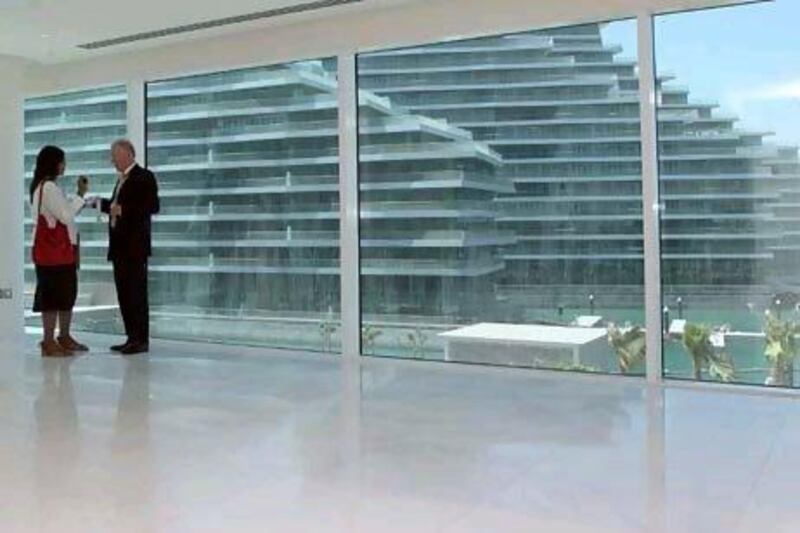Aldar Properties, Abu Dhabi's largest developer, is rolling out a rent-to-own programme, hoping to jump-start sales of new homes on Raha Beach.
Video:Rent to own in Abu Dhabi
Kevin Brass looks at the latest move by Aldar, the capital's largest developer, to encourage international buyers.
[ Watch this video in full screen here ]
The move comes two months after Aldar's rival Sorouh Real Estate launched its own rent-to-own programme, the first in Abu Dhabi, for apartments in Sun Tower on Reem Island.
"We believe there is a huge demand in the market for this type of product," said Rami Nasser, the director of sales and commercial leasing for Aldar.
Rent-to-own programmes offer tenants a path to ownership at a time when consumers are wary of buying and financing for home purchases is scarce.
"There is a latent demand in the market for people to own a home," said Paul Maisfield, the general manager of Asteco, a property firm. "One of the main barriers to entering the market and buying is the deposit."
Aldar's programme is available on the unsold units in Al Zeina, one of the largest projects in the capital open to international buyers. Aldar started handing over units in July in the Raha Beach development, which will eventually include 952 apartments, 180 villas and retail space on 500 metres of beach.
The rent-to-own deal is also available on a few unsold units in the Al Bandar project, Mr Nasser said. And it is likely to be offered in Al Muneera, the mixed-use development of 14-storey buildings due to hand over later this year, he said.
"We believe the rental market is strong and growing as compared to the sales market," Mr Nasser said. But the objective is to give customers a chance to experience the project and "convert them to homeowners", he said.
Under Aldar's programme, participants will commit to renting a unit for a set rate for two years. At the end of two years, 100 per cent of the first year's rent and 90 per cent of the second year's rent would be converted to equity towards a purchase at a predetermined price.
During the two-year period, the tenant will not pay service charges.
Aldar's programme also allows participants to transfer their equity to a new tenant if they leave the unit within two years.
The rental and sales rates offered in the programme will represent a "very small premium" on typical prices, Mr Nasser said.
The risk for participants is that rents and sales prices are forecast to decline in the next two years, Mr Maisfield noted. But the tenants are not obligated to buy.
"As long as the premium is not too high, I don't know why it wouldn't be attractive," Mr Maisfield said.
Sorouh's rent-to-own option has generated "very positive take-up", said Paul Middleton, the executive director of sales and marketing.
Sorouh's deal fixes rents for three years. At the end of that period the tenant can buy the property at the agreed price, with 90 per cent of the paid rent converted to equity. The tenant can exit the agreement without penalty.





